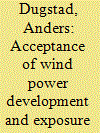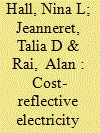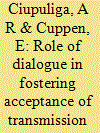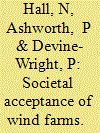|
|
|
Sort Order |
|
|
|
Items / Page
|
|
|
|
|
|
|
| Srl | Item |
| 1 |
ID:
177143


|
|
|
|
|
| Summary/Abstract |
Despite a large stated-preference (SP) literature on wind power externalities, few SP studies employ a case-control approach to examine whether people's acceptance of new wind power developments and renewable energy initiatives increases or decreases with exposure. Furthermore, the existing studies are inconclusive on this issue. In a case-control discrete choice experiment, we measure the level of acceptance in terms of people's willingness-to-accept (WTA) for having future land-based wind power developments in Norway; comparing exposed and non-exposed people's WTA. We find that exposure lowers acceptance. Furthermore, exposed people are also unwilling to pay as much to increase general domestic renewable energy production (from all sources) as non-exposed people, and thus have lower acceptance for such renewable energy policy initiatives. After testing for type of exposure, we argue that the inconclusiveness in the literature of how exposure affects acceptance of wind power developments could be due to the fact that impacts considered differ somewhat across studies.
|
|
|
|
|
|
|
|
|
|
|
|
|
|
|
|
| 2 |
ID:
150724


|
|
|
|
|
| Summary/Abstract |
In Australia, residential electricity peak demand has risen steeply in recent decades, leading to higher prices as new infrastructure was needed to satisfy demand. One way of limiting further infrastructure-induced retail price rises is via ‘cost-reflective’ electricity network pricing that incentivises users to shift their demand to non-peak periods. Empowering consumers with knowledge of their energy usage is critical to maximise the potential benefits of cost-reflective pricing. This research consulted residential electricity consumers in three Australian states on their perceptions and acceptance of two cost-reflective pricing scenarios (Time-of-Use and Peak Capacity pricing) and associated technologies to support such pricing (smart meters, in-home displays and direct load control devices). An energy economist presented information to focus groups on the merits and limitations of each scenario, and participants’ views were captured. Almost half of the 53 participants were agreeable to Time-of-Use pricing, but did not have a clear preference for Peak Capacity pricing, where the price was based on the daily maximum demand. Participants recommended further information to both understand and justify the potential benefits, and for technologies to be introduced to enhance the pricing options. The results have implications for utilities and providers who seek to reduce peak demand.
|
|
|
|
|
|
|
|
|
|
|
|
|
|
|
|
| 3 |
ID:
109667


|
|
|
|
|
| Publication |
2011.
|
| Summary/Abstract |
Issues of social acceptance, such as lack of awareness and negative community perceptions and reactions, can affect low emission energy technology development, despite general support observed for reducing carbon emissions and mitigating climate change. Negative community reactions and lack of understanding have affected geothermal developments, as demonstrated by the fearful community reactions and negative media experienced in response to seismic disturbances caused by "hot rock" geothermal energy generation in Switzerland and Germany. Focusing on geothermal energy, this paper presents the results of using a participatory action research methodology to engage diverse groups within the Australian public. A key finding is that the majority of the Australian public report limited the knowledge or understanding of geothermal technology and have various concerns including water usage and seismic activity instigated by geothermal drilling. However, geothermal energy receives general support due to a common trend to champion renewable energy sources in preference to traditional forms of energy generation and controversial technologies. This paper also demonstrates the effectiveness of using an engagement process to explore public understanding of energy technologies in the context of climate change, and suggests a way forward for governments and industry to allocate resources for greatest impact when communicating about geothermal technology.
|
|
|
|
|
|
|
|
|
|
|
|
|
|
|
|
| 4 |
ID:
124227


|
|
|
|
|
| Publication |
2013.
|
| Summary/Abstract |
It is a recognized fact that the lack of public and political support is one of the main sources of delay in building new transmission lines. In an energy era where there is an increasing lag between transmission grid development and the rapid generation growth, it is essential to streamline the related transmission line approval procedures. There is a strong relationship between stakeholder engagement on one side, and acceptance and support on the other side. The aim of the paper is to investigate ways of fostering acceptance of transmission lines through participation by analyzing in detail the case of a disputed France-Spain interconnection project. We argue that participatory processes should embrace not only an instrumental rationale, but also normative and substantive rationales. Based on literature and the case study, we analyze this important condition for effective participation in transmission planning procedures.
|
|
|
|
|
|
|
|
|
|
|
|
|
|
|
|
| 5 |
ID:
122728


|
|
|
|
|
| Publication |
2013.
|
| Summary/Abstract |
Australia's renewable energy target (RET) seeks to provide 20 per cent of Australia's electricity generation from renewable energy sources by 2020. As wind power is relatively advanced, it was anticipated that wind power will contribute a major component of the early target. However, high levels of societal resistance to wind farms, combined with new regulatory policies, indicate the RET may not be dominated by wind power. This research involved an examination of seven case studies around wind farm deployment. Qualitative interviews were the primary data for the case studies and analysed using methods informed by grounded theory. Despite the diversity of stakeholder views, the qualitative analysis identified strong community support for wind farms but four common themes emerged that influence this societal acceptance of wind farms in Australia: trust, distributional justice, procedural justice and place attachment. Without addressing these factors through integration into policy development and engagement approaches, wind energy is unlikely to provide the early and majority of new renewable energy. Similar international experiences are incorporated in the discussion of the Australian wind industry's societal acceptance.
|
|
|
|
|
|
|
|
|
|
|
|
|
|
|
|
|
|
|
|
|